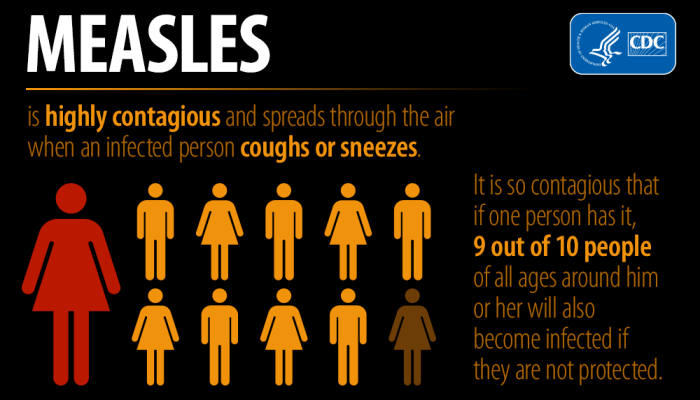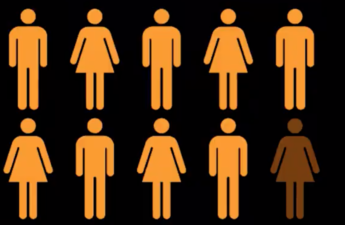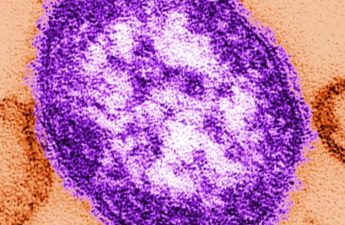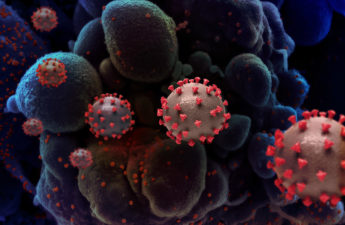
From Public Health – Seattle & King County
July 15, 2019
Public Health – Seattle & King County is investigating a new confirmed measles case in a King County resident, a woman in her 20s, with possible public exposures in Kenmore and Seattle.
According to press reports the woman is a nurse at Seattle Children’s Hospital and contracted the measles from a patient that was diagnosed with the measles.
She was in close contact of a previously diagnosed person with measles, and was infectious and in public before being diagnosed with the measles.
This case brings the total to ten measles cases in King County residents since the beginning of May.
NOTE: All exposure locations in King County, including those from previous cases in 2019, are updated at www.kingcounty.gov/measles/cases.
Measles cases continue to occur in King County, which means we face an ongoing risk of outbreaks among people who don’t have immunity,” said Jeff Duchin, Health Officer for Public Health – Seattle & King County. “Measles vaccine is safe, effective, and offers excellent protection. If you aren’t sure if you’re up to date with the recommended doses of measles, mumps, and rubella vaccine (MMR), see your health care provider and get a dose of MMR if needed.”
Location of potential exposure to the public
Transmission of measles can occur before people know they have the disease, before any rash appears. Before the measles diagnosis was made, the two individuals were in the following public locations:
| Date | Time | Location |
| July 11, 2019 | 7:50 am – 9:50 am | Seattle Children’s Hospital, Mountain entrance, 4500 40th Ave NE, Seattle 98105 |
| July 10, 2019 | 6:30 pm – 8:30 pm | Seattle Children’s Hospital, Mountain entrance, 4500 40th Ave NE, Seattle 98105 |
| July 10, 2019 | 8:30 am – 11:00 am | Safeway, 6850 NE Bothell Way, Kenmore 98028 |
| July 10, 2019 | 7:30 am – 9:30 am | Seattle Children’s Hospital, Mountain entrance, 4500 40th Ave NE, Seattle 98105 |
| July 9, 2019 | 11:00 pm – 1:10 am | Starbucks in Seattle Children’s Hospital, Forest 1st Floor, 4500 40th Ave NE, Seattle 98105 |
| July 9, 2019 | 6:20 pm – 8:20 pm | Seattle Children’s Hospital, Parking Lot 3 and River entrance, elevator to C6 Unit, 4500 40th Ave NE, Seattle 98105 |
| July 9, 2019 | 7:30 am – 9:30 am | Seattle Children’s Hospital, River 6th floor to stairwell closest to Parking Lot 3, 4500 40th Ave NE, Seattle 98105 |
| July 8, 2019 | 10:40 pm – 12:45 am | Starbucks in Seattle Children’s Hospital, Forest 1st Floor, 4500 40th Ave NE, Seattle 98105 |
| July 8, 2019 | 10:30 am – 12:30 pm | Seattle Children’s Hospital, Parking Lot 3 and Forest/Staff entrance, 4500 40th Ave NE, Seattle 98105 |
| July 8, 2019 | 7:00 pm – 9:45 pm | Metropolitan Market Sand Point, 5250 40th Ave NE, Seattle 98105 |
These times include the period when the individual was at the location and two hours after. Measles virus can remain in the air for up to two hours after someone infectious with measles leaves the area. Anyone who was at these locations during the times listed could have been exposed to measles.
What to do if you were in a location of potential measles exposure
Most people in our area have immunity to the measles through vaccination, so the risk to the general public is low.
However, anyone who was in the locations of potential exposure to measles around the times listed below should:
- Find out if you have been vaccinated for measles or have had measles previously. Make sure you are up-to-date with the recommended number of measles (MMR) vaccinations.
- Call a healthcare provider promptly if you develop an illness with fever or illness with an unexplained rash. To avoid possibly spreading measles to others, do not go to a clinic or hospital without calling first to tell them you want to be evaluated for measles.
- Vaccination or medication can be given after exposure in some cases to prevent illness – check with your healthcare provider. This is especially important for people at high risk for measles complications (see below).
Measles symptoms could appear starting from seven days after the first exposure to twenty-one days after the last exposure to someone with measles. Rash is most likely to appear a few days after the fever, ten to twelve days after an exposure.
About measles
Measles is a highly contagious and potentially severe disease that causes fever, rash, cough, and red, watery eyes. It mainly spreads through the air after a person with measles coughs or sneezes.
Measles is contagious from approximately four days before the rash appears through four days after the rash appears. People can spread measles before they have the characteristic measles rash.
Measles complications can include ear infections, diarrhea, pneumonia, and rarely, encephalitis (brain inflammation). Anyone could have serious measles complications, but of particular concern are infants and children under five years, pregnant women, and people with weakened immune systems from drugs or underlying disease. If you are in one of these high-risk groups and were exposed to measles, be sure to contact your health care provider to discuss the need for treatment to prevent measles infection.
Measles is preventable with the safe and highly effective measles, mumps and rubella (MMR) vaccine. According to the Centers for Disease Control and Prevention (CDC), two doses of the MMR vaccine are more than 95 percent effective in preventing measles and that protection is long lasting.
For more information about measles and measles vaccination, including where to get measles vaccinations: www.kingcounty.gov/measles/cases


